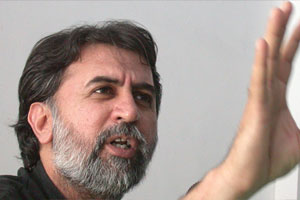 New Delhi, Nov 29: Rejecting "insinuations" that her complaint is part of a pre-election political conspiracy, the victim of Tehelka Editor Tarun Tejpal's alleged sexual assault today said what he did to her "falls within the legal definition of rape".
New Delhi, Nov 29: Rejecting "insinuations" that her complaint is part of a pre-election political conspiracy, the victim of Tehelka Editor Tarun Tejpal's alleged sexual assault today said what he did to her "falls within the legal definition of rape".
In a statement ahead of Tejpal's journey to Goa to face police questioning, she said she was heartened by the broad support she has received over the past fortnight.
"However, I am deeply concerned and very disturbed by insinuations that my complaint is part of a pre-election political conspiracy," she said in a two-page statement.
Categorically refuting such insinuations, she put forward arguments to say what Tejpal did was rape.
While he was fighting to protect his wealth, influence and privilege, for her it was a fight to preserve nothing except "my integrity and my right to assert that my body is my own and not the plaything of my employer."
"Perhaps the hardest part of this unrelentingly painful experience has been my struggle with taxonomy. I don't know if I am ready to see myself as a "rape victim", for my colleagues, friends, supporters and critics to see me thus.
"It is not the victim that categorises crimes: it is the law. And in this case, the law is clear: what Mr Tejpal did to me falls within the legal definition of rape," the victim, a journalist in Tehelka, said. She has since resigned.
The girl said, "I categorically refute such insinuations and put forward the following arguments: The struggle for women to assert control over their lives and their bodies is most certainly a political one, but feminist politics and its concerns are wider than the narrow universe of our political parties.
"Thus, I call upon our political parties to resist the temptation to turn a very important discussion about gender, power and violence into a conversation about themselves."
Refuting allegations that she was acting on someone's behest, she said, "Suggestions that I am acting on someone else's behest are only the latest depressing indications that sections of our public discourse are unwilling to acknowledge that women are capable to making decisions about themselves for themselves.
"In this past week, television commentators who should know better, have questioned my motivations and my actions during and after Mr. Tejpal molested me.
"Some have questioned the time it took for me to file my complaint, more inquisitive commentators have questioned the use of the word "sexual molestation" versus words like "rape"," she said.
The victim also termed her case as a litmus test of the new anti-rape law.
"Now that we have a new law that broadens the definition of rape, we should stand by what we fought for. We have spoken, time and again, about how rape is not about lust or sex, but about power, privilege and entitlement. Thus this new law should be applicable to everybody - the wealthy, the powerful, and the well connected - and not just to faceless strangers," she said.
As seen by some of the responses to this case, instances of familial and custodial rape present doughty challenges to even the most adamantine feminists, she added.
She said that by choosing this path, she has opened herself to "personal and slanderous attack" and this will not be an easy battle.
"Unlike Mr. Tejpal, I am not a person of immense means. I have been raised singlehandedly by my mother's single income. My father's health has been very fragile for many years now.
"By filing my complaint, I have lost not just a job that I loved, but much-needed financial security and the independence of my salary. I have also opened myself to personal and slanderous attack. This will not be an easy battle," she said.
Remembering her days as a journalist reporting stories of rape survivors, she said that this "crisis" has confirmed the difficulties faced by them.
"In my life, and my writings, I have always urged women to speak out and break the collusive silence that surrounds sexual crime. This crisis has only confirmed the myriad difficulties faced by survivors.
"First, our utterances are questioned, then our motivations, and finally our strength is turned against us: a politician will issue a statement claiming that speaking out against sexual violence will hurt our professional prospects; an application filed in the Delhi High Court will question why the victim remained "normal"," she said.
"Had I chosen silence in this instance, I would not have been able to face either myself or the feminist movement that is forged and renewed afresh by generations of strong women," she said.
"Finally, an array of men of privilege have expressed sorrow that Tehelka, the institution, has suffered in this crisis. I remind them that this crisis was caused by the abusive violence of the magazine's Editor-in-Chief, and not by an employee who chose to speak out," she said.







Comments
Add new comment